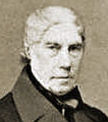| |
Date |
Event(s) |
| 1 | 1763 | - 16 Apr 1763—13 Jul 1765: George Grenville, UK Prime Minister (Whig)

George Grenville
|
| 2 | 1764 | - 1764: Lloyd's Register of shipping first prepared
- 1764: Practice of numbering houses introduced to London
- 1764: James Hargeaves invents the Spinning Jenny (but destroyed 1768)
- 1764: Mozart produces his first symphony at age eight
|
| 3 | 1765 | |
| 4 | 1766 | - 1766: Start of 'composite' national records on rainfall in the UK
- 30 Jul 1766—14 Oct 1768: William Pitt 'The Elder', 1st Earl of Chatham, UK Prime Minister (Whig)

William Pitt 'The Elder', 1st Earl of Chatham
- 5 Dec 1766: Christie's auction house founded in London by James Christie
|
| 5 | 1767 | - 1767: Newcomen's steam pumping engine perfected by James Watt
|
| 6 | 1768 | - 9 Jan 1768: Philip Astley starts his circus in London
- 14 Oct 1768—28 Jan 1770: Augustus Henry Fitzroy, 3rd Duke of Grafton, UK Prime Minister (Whig)

Augustus Henry Fitzroy, 3rd Duke of Grafton
- 6 Dec 1768: The first edition of the "Encyclopaedia Britannica" published in Edinburgh by
William Smellie
|
| 7 | 1769 | - 1769: Arkwright invents water frame (textile production)
- 1769: Capt James Cook maps the coast of New Zealand
- 6 Sep 1769: David Garrick organises first Shakespeare festival at Stratford-upon-Avon
|
| 8 | 1770 | - 1770: Clyde Trust created to convert the River Clyde, then an insignificant river, into a major
thoroughfare for maritime communications
- 28 Jan 1770—22 Mar 1782: Lord Frederick North, UK Prime Minister (Whig)

Lord Frederick North
- 28 Apr 1770: Capt James Cook lands in Australia (Botany Bay)
|
| 9 | 1771 | - 1771: Right to report Parliamentary debates established in England
|
| 10 | 1772 | - 1772: First Travellers' Cheques issued by the London Credit Exchange Company
- 1772: "Morning Post" first published (until 1937)
- 14 May 1772: Judge Mansfield rules that there is no legal basis for slavery in England
|
| 11 | 1774 | - 13 Sep 1774: Cook arrives on Easter Island
|
| 12 | 1775 | - 1 Jan 1775: The first Loyalists arrive in Canada
- 18 Apr 1775: American Revolutionary War
- 19 Apr 1775: Battle of Lexington: first action in American War of Independence (1775
|
| 13 | 1776 | - 1776: Somerset House in London becomes the repository of records of population
- 1776: Watt and Boulton produce their first commercial steam engine
- 4 Jul 1776: American Declaration of Independence
- 7 Sep 1776: First attack on a warship by a submarine
|
| 14 | 1777 | - 1777: Samuel Miller of Southampton patents the circular saw.
|
| 15 | 1779 | - 1779: Marc Isambard Brunel opens the first steamdriven sawmill at Chatham Dockyard in Kent
- 1779: First iron bridge built, over the Severn by John Wilkinson
- 1779: First Spinning Mills operational in Scotland
- 14 Feb 1779: Capt James Cook killed on Hawaii
- 23 Sep 1779: Naval engagement between Britain and USA off Flamborough Head
|
| 16 | 1780 | - 1780: Male Servants Tax
- 1780: The English Reform Movement
- 1780: Fountain pen invented
- 1780: About this time the word 'Quiz' entered the language, said to have been invented as a
wager by Mr Daly, a Dublin theatre manager
- 1780: Canada Quakers
The underground railroad is founded by Quakers who help slaves escape to Canada
- 4 May 1780: First Derby run at Epsom (some say 2nd June)
|
| 17 | 1782 | |
| 18 | 1783 | - 1783: Duty payable on Parish Register entries (3d per entry
- 1783: Canada German
Pennsylvania Germans immigrate to southwestern Ontario
- 2 Apr 1783—19 Dec 1783: William Bentinck Duke of Portland, UK Prime Minister (Whig)
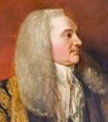
William Bentinck Duke of Portland
- 3 Sep 1783: Treaty of Versailles (Britain/US)
- 3 Nov 1783: Last public execution at Tyburn in London (John Austin, a highwayman)
- 19 Dec 1783—14 Mar 1801: William Pitt 'The Younger', UK Prime Minister (Tory)

William Pitt the Younger
|
| 19 | 1784 | - 1784: Pitt's India Act
- 1784: Wesley breaks with the Church of England
- 1784: First golf club founded at St Andrews
- 1784: Invention of threshing machine by Andrew Meikle
- 2 Aug 1784: First mail coaches in England (4pm Bristol / 8am London)
|
| 20 | 1785 | - 1785: Sunday School Society founded to educate poor children (by 1851, enrols more than 2
million)
- 1785: Northwest Indian War
- 1 Jan 1785: John Walter publishes first edition of The Times (called The Daily Universal
Register for 3 years)
|
| 21 | 1787 | - 1787: MCC (Marylebone Cricket Club) established at Thomas Lord's ground in London
|
| 22 | 1788 | - 1788: First steamboat demonstrated in Scotland
- 1788: Law passed requiring that chimney sweepers be a minimum of 8 years old (not
enforced)
- 1788: First slave carrying act, the Dolben Act of 1788, regulates the slave trade
- 1788: King George III's mental illness occasions the Regency Crisis
- 1788: Gibbon completes "Decline and Fall of the Roman Empire"
- 26 Jan 1788: First convicts (and free settlers) arrive in New South Wales (left Portsmouth 13
May 1787)
- 26 Jan 1788: Australia New South Wales
New South Wales colony is founded by the British as a penal colony
|
| 23 | 1789 | - 28 Apr 1789: Mutiny on HMS Bounty
- 30 Apr 1789—3 Mar 1797: George Washington, 1st President of the United States

George Washington
- 27 Dec 1789: Canada stagecoach
Canada's first stage coach service is established between Queenston and Fort Erie
|
| 24 | 1790 | - 1790: Forth and Clyde Canal opened in Scotland
- 1790: Australian colony
Australian colony experiences a food shortage
|
| 25 | 1791 | - 1791: John Bell, printer, abandons the "long s" (the "s" that looks like an "f")
- 1791: Establishment of the Ordnance Survey of Great Britain
- 1791: Canada
Lower Canada (Quebec) and Upper Canada (Ontario) are formed
- 4 Dec 1791: First publication of The Observer
|
| 26 | 1792 | - 1792: Repression in Britain (restrictions on freedom of the press)
- 1792: Boyle's Street Directory published
- 1792: Coal-gas lighting invented by William Murdock, an Ayrshire Scot
- 1 Oct 1792: Introduction of Money Orders in Britain
- 1 Dec 1792: King's Proclamation drawing out the British militia
|
| 27 | 1793 | - 11 Feb 1793: Britain declares war on France (1793-1802)
|
| 28 | 1794 | - 1794: Abolition of Parish Register duties
- 6 Oct 1794: The prosecutor for Britain, Lord Justice Eyre, charges reformers with High
Treason
|
| 29 | 1795 | - 1795: The Famine Year
- 1795: Foundation of the Orange Order
- 1795: Speenhamland Act proclaims that the Parish is responsible for bringing up the labourer's
wage to subsistence level
- 1795: Pitt and Grenville introduce "The Gagging Acts" or "Two Bills" (the Seditious Meetings and Treasonable Practices Bills)
- 1795: Consumption of lime juice made compulsory in Royal Navy
|
| 30 | 1796 | - 1796: Pitt's "Reign of Terror": More treason trials
- 1796: Legacy Tax on sums over
- 14 May 1796: Dr Edward Jenner gave first vaccination for smallpox in England
|
| 31 | 1797 | - 1797: England in Crisis, Bank of England suspends cash payments
- 1797: Mutinies in the British Navy at Spithead and Nore
- 1797: Tax on newspapers (including cheap, topical journals) increased to repress radical
publications
- 1797: The first copper pennies were produced ('cartwheels') by application of steam power to
the coining press
- 22 Feb 1797: French invade Fishguard, Wales; last time UK invaded; all captured 2 days later
- 4 Mar 1797—3 Mar 1801: John Adams, 2nd President of the United States

John Adams
- 18 Jun 1797: Canada Mail
The first mail service between Canada and the United States is established
|
| 32 | 1798 | - 1798: First planned human experiment with vaccination, to test theories of Edward Jenner
- 9 Jan 1798: Franco-American War
- Feb 1798: The Irish Rebellion; 100,000 peasants revolt; approximately 25,000 die
- 1 Aug 1798: Battle of the Nile (won by Nelson)
|
| 33 | 1799 | - 1799: Foundation of Royal Military College Sandhurst by the Duke of York
- 1799: Foundation of the Royal Institution of Great Britain
- 9 Jan 1799: Pitt brings in 10% income tax, as a wartime financial measure
- 12 Jul 1799: 'Combination Laws' in Britain against political associations and combinations
- 15 Jul 1799: "Rosetta Stone" discovered in Egypt, made possible the deciphering (in 1822) of Ancient Egyptian hieroglyphics
|
| 34 | 1800 | - 1800: Electric light first produced by Sir Humphrey Davy
- 1800: Use of high pressure steam pioneered by Richard Trevithick (1771-1833)
- 1800: Royal College of Surgeons founded
- 1800: Herschel discovers infra-red light
- 1800: Volta makes first electrical battery
- 2 Jul 1800: Parliamentary union of Great Britain and Ireland
|
| 35 | 1801 | - 1801: Grand Union Canal opens in England
- 1801: Elgin Marbles brought from Athens to London
- 1 Jan 1801: Union Jack becomes the official British flag
- 4 Mar 1801—3 Mar 1809: Thomas Jefferson, 3rd President of the United States
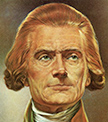
Thomas Jefferson
- 10 Mar 1801: First census puts the population of England and Wales at 9,168,000. Population of Britain nearly 11 million (75% rural)
- 17 Mar 1801—10 May 1804: Henry Addington, 1st Viscount Sidmouth, UK Prime Minister (Tory)

Viscount Sidmouth
- 1 Apr 1801: First Barbary War
- 24 Dec 1801: Richard Trevithick built the first self-propelled passenger carrying road loco
|
| 36 | 1802 | - 25 Mar 1802: Treaty of Amiens signed by Britain, France, Spain, and the Netherlands
|
| 37 | 1803 | - 1803: Poaching made a Capital offence in England if capture resisted
- 1803: Richard Trevithick built another steam carriage and ran it in London as the first
self-propelled vehicle in the capital and the first London bus
- 1803: Semaphore signalling perfected by Admiral Popham
- 30 Apr 1803: Louisiana Purchase: Napoleon sells French possessions in America to United States
- 12 May 1803: Peace of Amiens ends
- 23 Jul 1803: First public railway opens (Surrey Iron Railway, 9 miles from Wandsworth to
Croydon, horse-drawn)
|
| 38 | 1804 | - 1804: Matthew Flinders recommends that the newly discovered country, New Holland, be renamed "Australia"
- 21 Feb 1804: Richard Trevithick runs his railway engine on the Penydarren Railway (9.5 miles
from Pen-y-Darren to Abercynon in South Wales)
- 3 Mar 1804: John Wedgwood (eldest son of the potter Josiah Wedgwood) founds The Royal
Horticultural Society
- 10 May 1804—23 Jan 1806: William Pitt 'The Younger', UK Prime Minister (Tory)

William Pitt the Younger
- 2 Dec 1804: Napoleon declares himself Emperor of the French
- 12 Dec 1804: Spain declares war on Britain
|
| 39 | 1805 | - 1805: London docks opened
- 21 Oct 1805: Admiral Nelson's victory at Trafalgar
- 2 Dec 1805: Battle of Austerlitz; Napoleon defeats Austrians and Russians
|
| 40 | 1806 | - 1806: Dartmoor Prison opened (built by French prisoners)
- 9 Jan 1806: Nelson buried in St Paul's cathedral, London
- 11 Feb 1806—31 Mar 1807: William Wyndham Grenville, 1st Baron Grenville, UK Prime Minister (Whig)

William Wyndham Grenville, 1st Baron Grenville
|
| 41 | 1807 | - 25 Mar 1807: Parliament passes Act prohibiting slavery and the importation of slaves from 1808
- 31 Mar 1807—4 Oct 1809: William Bentinck, Duke of Portland, UK Prime Minister (Whig)

William Bentinck, Duke of Portland
|
| 42 | 1808 | - 1808: Gas lighting in London streets
- 13 Jul 1808: 'Hot Wednesday'
- 20 Dec 1808: Beethoven premieres his Fifth Symphony, Sixth Symphony, Fourth Piano Concerto and Choral Fantasy together in Vienna
|
| 43 | 1809 | - 12 Feb 1809: Birth of Charles Darwin
- 4 Mar 1809—3 Mar 1817: James Madison, 4th President of the United States
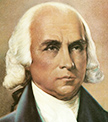
James Madison
- 18 Sep 1809: Royal Opera House opens in London
- 4 Oct 1809—11 May 1812: Spencer Perceval, UK Prime Minister (Tory)
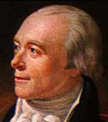
Spencer Perceval
|
| 44 | 1810 | - 1810: John McAdam begins road construction in England, giving his name to the process of
road metalling
|
| 45 | 1811 | - 5 Feb 1811: Prince of Wales (future George IV) made Regent after George III deemed insane
|
| 46 | 1812 | - 11 May 1812: Prime Minister, Spencer Perceval, assassinated
- 8 Jun 1812—9 Apr 1827: Robert Banks Jenkinson, Earl of Liverpool, UK Prime Minister (Tory)

Robert Banks Jenkinson, Earl of Liverpool
- 12 Jun 1812: War of 1812
- 18 Jun 1812: Start of American "War of 1812" (to 1814) against England and Canada
- Oct 1812: Napoleon retreats from Moscow with catastrophic losses
|
| 47 | 1813 | - 1813: Ireland: First recorded "12th of July" sectarian riots in Belfast
- 1813: Jane Austen wrote "Pride and Prejudice"
|
| 48 | 1814 | - 1 Jan 1814: Invasion of France by Allies
- 6 Apr 1814: Napoleon abdicates and is exiled to Elba
- 13 Aug 1814: Convention of London signed, a treaty between the UK and the Dutch
- 24 Aug 1814: The British burn the White House
- 29 Nov 1814: "The Times" first printed by a 'mechanical apparatus' (at 1,100 sheets per hour)
- 24 Dec 1814: Treaty of Ghent signed ending the 1812 war between Britain and the US
|
| 49 | 1815 | - 1815: Trial by Jury established in Scotland
- 1815: Davy develops the safety lamp for miners
- 3 Mar 1815: Second Barbary War
- 18 Jun 1815: The Battle of Waterloo: Napoleon defeated and exiled to St. Helena
|
| 50 | 1816 | - 1816: Income tax abolished
- 1816: For the first time British silver coins were produced with an intrinsic value substantially
below their face value
- 1816: Climate: the 'year without a summer'
- 1816: Large scale emigration to North America
- 1816: Trans-Atlantic packet service begins
|
| 51 | 1817 | - 1817: March of the Manchester Blanketeers; Habeas Corpus suspended
- 1817: Constable painted "Flatford Mill"
- 4 Mar 1817—3 Mar 1825: James Monroe, 5th President of the United States
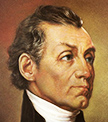
James Monroe
|
| 52 | 1818 | - 1818: Manchester cotton spinners' strike
- 20 Oct 1818: 'Convention of 1818' signed between the United States and the United Kingdom
which, among other things, settled the US-Canada border on the 49th parallel for most of its
length
|
| 53 | 1819 | - 1819: Primitive bicycle, the Dandy Horse, becomes popular
- 1819: Britain returns to gold standard
- 1819: Singapore founded by Sir Stamford Raffles
- May 1819: SS "Savannah" first steamship to cross Atlantic, reaching Liverpool 20 June 1819 (26
days, mostly under sail)
- 16 Aug 1819: Peterloo Massacre at Manchester
|
| 54 | 1820 | - 1820: Cato Street Conspiracy
- 1820: Abolition of the Spanish Inquisition
- 29 Jan 1820: Accession of George IV, previously Prince Regent
- 1 Aug 1820: Regent's Canal in London opens
- 17 Aug 1820: Trial of Queen Caroline to prove her infidelities so George IV can divorce her
|
| 55 | 1821 | - 1821: Faraday publishes "Principles of electro-magnetic rotation"
- 1821: Constable paints "The Hay Wain"
- 5 May 1821: Napoleon Bonaparte dies on St Helena
|
| 56 | 1822 | - 14 Jun 1822: Charles Babbage proposes a difference engine in a paper to the Royal Astronomical Society
|
| 57 | 1823 | - 1823: New laws concerning marriage by licence
- 1823: Peel begins penal reforms
- 1823: Rugby Football 'invented' at Rugby School
- 1823: Rubberised waterproof material produced by MacIntosh
- 2 Dec 1823: US President James Monroe delivers a speech establishing American neutrality in
future European conflicts (the 'Monroe Doctrine')
|
| 58 | 1824 | - 1824: RSPCA established
- 1824: Portland cement patented
- 4 Mar 1824: Royal National Lifeboat Institution (RNLI) founded (called the "National
Institution for the Preservation of Life from Shipwreck" until 1854)
- 10 May 1824: National Gallery in London opens to the public
|
| 59 | 1825 | - 1825: Census Quebec
Census is taken over Lower Canada (Quebec)
- 4 Mar 1825—3 Mar 1829: John Quincy Adams, 6th President of the United States
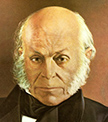
John Quincy Adams
- 27 Sep 1825: Stockton to Darlington Railway opens
- 3 Dec 1825: Van Diemen's Land
Van Diemen's Land colony is formed
|
| 60 | 1826 | - 1826: Netherlands
Malaria is among the 193 333 component Friesian population more than 4,000 fatalities
|
| 61 | 1827 | - 1827: Ohm's Law published
- 15 Mar 1827: Canada Education
University of Toronto is chartered
- 10 Apr 1827—8 Aug 1827: George Canning, UK Prime Minister (Tory)
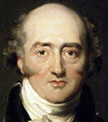
George Canning
- 31 Aug 1827—21 Jan 1828: Frederick Robinson, Viscount Goderich, UK Prime Minister (Tory)
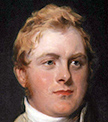
Frederick Robinson, Viscount Goderich
|
| 62 | 1828 | - 1828: Census Australia
The first Australian Census is taken
- 22 Jan 1828—16 Nov 1830: Arthur Wellesley, 1st Duke of Wellington, UK Prime Minister (Tory)
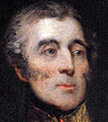
Arthur Wellesley, 1st Duke of Wellington
- 25 Oct 1828: St Katharine Docks in London opened (designed by Thomas Telford)
|
| 63 | 1829 | - 1829: London Metropolitan Police Force formed, nicknamed "Bobbies" after Sir Robert Peel
- 1829: Louis Braille invents his sytem of finger-reading for the blind
- 1829: Australia British
The continent of Australia is claimed as a British territory
- 4 Mar 1829—3 Mar 1837: Andrew Jackson, 7th President of the United States

Andrew Jackson
- 2 May 1829: Australia
Swan River colony is formed
- 10 Jun 1829: First Oxford/Cambridge Boat Race
- 6 Oct 1829: George Stephenson's Rocket wins the Rainhill trials (it was the only one to
complete the trial!)
|
| 64 | 1830 | - 1830: Uprisings and agitation across Europe: the Netherlands are split into Holland and
Belgium
- 1830: Origional Australians
An attempt to force Aborigional people onto the Tasmanian peninsula is made
- Jul 1830: Revolution in France, fall of Charles X and the Bourbons
- 15 Sep 1830: George Stephenson's Liverpool & Manchester Railway opened by the Duke of
Wellington
- 22 Nov 1830—9 Nov 1834: Charles Grey, 2nd Earl Grey, UK Prime Minister (Whig)
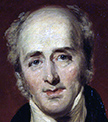
Charles Grey, 2nd Earl Grey
|
| 65 | 1831 | - 1831: A list of all parish registers dating prior to 1813 compiled
- 1 Jun 1831: James Clark Ross discovers the North Magnetic Pole
- 1 Aug 1831: 'New' London Bridge opens (replaced 1973)
|
| 66 | 1832 | - 1832: Electoral Registers introduced
- 1832: Electric telegraph invented by Morse
- 6 Feb 1832: Australia Swan River
Swan River colony is renamed Western Australia
- 14 May 1832: Black Hawk War
- 7 Jun 1832: Reform Bill passed
|
| 67 | 1833 | - Jan 1833: Britain invades the Falkland Islands
- 29 Aug 1833: Factory Act forbids employment of children below age of 9
|
| 68 | 1834 | - 1834: Babbage invents forerunner of the computer
- 18 Mar 1834: 'Tolpuddle Martyrs' transported (to Australia) for Trades Union activities
- 1 May 1834: Slavery abolished in British possessions
- 16 Jul 1834—14 Nov 1834: William Lamb, 2nd Viscount Melbourne, UK Prime Minister (Whig)

William Lamb, 2nd Viscount Melbourne
- 14 Nov 1834—10 Dec 1834: Arthur Wellesley, 1st Duke of Wellington, UK Prime Minister (Tory)

Arthur Wellesley, 1st Duke of Wellington
- 10 Dec 1834—8 Apr 1835: Sir Robert Peel, 2nd Baronet, UK Prime Minister (Conservative)
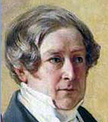
Sir Robert Peel, 2nd Baronet
|
| 69 | 1835 | - 1835: Christmas becomes a national holiday
- 1835: First railway boom period starts in Britain
- 1835: Origional Australians
It is declared by the governor of New South Wales that the Aborigines do not own their own land
- 18 Apr 1835—30 Aug 1841: William Lamb, 2nd Viscount Melbourne, UK Prime Minister (Whig)

William Lamb, 2nd Viscount Melbourne
- 2 Oct 1835: Texas War of Independence
|
| 70 | 1836 | - 1836: First Potato famine in Ireland
- 30 Jan 1836: Telford's Menai Straits Bridge opened
- 25 Feb 1836: Samuel Colt patented the 'revolver'
- 6 Mar 1836: The Alamo falls to Mexican troops
- 11 May 1836: Mexican-American War
- Jul 1836: Inauguration of the Arc de Triomphe in Paris
- 28 Dec 1836: South Australia
South Australia colony is founded with its western border set at 132° E
|
| 71 | 1837 | - 1837: Pitman introduces his shorthand system
- 1837: P&O Founded
- 4 Mar 1837—3 Mar 1841: Martin Van Buren, 8th President of the United States
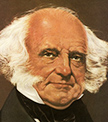
Martin Van Buren
- 20 Jun 1837: William IV dies
- 1 Jul 1837: Compulsory registration of Births, Marriages & Deaths in England & Wales
- 13 Jul 1837: Queen Victoria moves into the first Buckingham Palace
- 20 Jul 1837: Euston Railway station opens
|
| 72 | 1838 | - 1838: Australia Prussian Settlers
Prussian settlers arrive in South Australia, first time a large group of non-British settlers arrive
- 28 Jun 1838: Coronation of Queen Victoria at Westminster Abbey
|
| 73 | 1839 | - 1839: First Opium War between Britain and China (to 1842)
- 1839: Scottish blacksmith Kirkpatrick MacMillan refines the primitive bicycle, adding a
mechanical crank drive to the rear wheel, thus creating the first true "bicycle" in the modern
sense
- 1839: Charles Goodyear invented vulcanized rubber
- 1839: Australia Scottish
First Settlers from Scotland arrive in Port Phillip
- 1839: Netherlands recognizes the independence of Belgium
|
| 74 | 1840 | - 1840: Population Act relating to taking of censuses in Britain
- 1840: Last convicts landed in NSW (some say 1842 or 1849, but these probably landed
elsewhere)
- 1840: William I renounce the government. Willem II becomes King of the Netherlands
- 10 Jan 1840: Uniform Penny Postage introduced nationally
- 21 May 1840: New Zealand
New Zealand becomes part of New South Wales
- 16 Nov 1840: New Zealand
New Zealand colony is founded
|
| 75 | 1841 | - 1841: Thomas Cook starts package tours
- 1841: New Zealand
New Zealand is a separate colony and no longer part of New South Wales
- 10 Feb 1841: Penny Red replaces Penny Black postage stamp
- 4 Mar 1841—4 Apr 1841: William Henry Harrison, 9th President of the United States

William Henry Harrison
- 4 Apr 1841—3 Mar 1845: John Tyler, 10th President of the United States
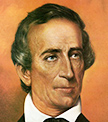
John Tyler
- 6 Jun 1841: June 6: First full census in Britain in which all names were recorded (Population 18.5M)
- 30 Aug 1841—29 Jun 1846: Sir Robert Peel, 2nd Baronet, UK Prime Minister (Conservative)

Sir Robert Peel, 2nd Baronet
|
| 76 | 1842 | - 1842: Income Tax reintroduced in Britain
- 30 Mar 1842: Ether used as an anaesthetic for the first time (by Dr Crawford Long in America)
- 29 Aug 1842: Treaty of Nanking
|
| 77 | 1843 | - 1843: First Christmas card in England
- 27 May 1843: The Great Hall of Euston station opened in London
- 19 Jul 1843: Brunel's 'Great Britain' launched
|
| 78 | 1844 | - 1844: Netherlands
very severe winter and the two following years, the potato crop failed . 's Population goes hungry.
- 6 Jun 1844: YMCA founded in London by Sir George Williams
|
| 79 | 1845 | - 1845: Tarmac laid for first time (in Nottingham)
- 4 Mar 1845—3 Mar 1849: James Knox Polk, 11th President of the United States

jJames K. Polk
- 17 Mar 1845: The rubber band patented by Stephen Perry
|
| 80 | 1846 | - 17 Feb 1846: North Australia
North Australia colony is founded covering all of New South Wales north of 26° S
- 30 Jun 1846—21 Feb 1852: Lord John Russell, 1st Earl Russell, UK Prime Minister (Whig)

Lord John Russell, 1st Earl Russell
- 10 Sep 1846: The sewing machine is patented by Elias Howe
|
| 81 | 1847 | - 1847: US Mormons make Salt Lake City their centre
- Jan 1847: An anaesthetic used for the first time in England (James Simpson used ether to numb the pain of labour)
- 15 Apr 1847: North Australia
North Australia is reincorporated into New South Wales
|
| 82 | 1848 | - 1848: First commercial production of chewing gum
- 24 Jan 1848: Gold found at Sutter's Mill, California
- 11 Jul 1848: Waterloo railway station in London opens
|
| 83 | 1849 | - 1849: Florin (2 shilling coin) introduced as the first step to decimalisation
- 1849: Netherlands
King William II dies of a heart attack . On May 12 , King William III inaugurated
- 4 Mar 1849—9 Jul 1850: Zachary Taylor, 12th President of the United States

Zachary Taylor
|
| 84 | 1850 | - 9 Jul 1850—3 Mar 1853: Millard Fillmore, 13th President of the United States
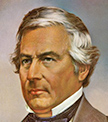
Millard Fillmore
|
| 85 | 1851 | - 1851: Gold discovered in Australia
- 1851: Australia Gold Rush
Gold is discovered at Summerhill Creek and Ballarat
- 1 May 1851: Great exhibition of the works of industry of all nations ("Crystal Palace" exhibition) opened in Hyde Park
- 1 Jul 1851: Australia Victoria
Victoria colony is founded
|
| 86 | 1852 | |
| 87 | 1853 | - 1853: Vaccination against smallpox made compulsory in Britain
- 4 Mar 1853—3 Mar 1857: Franklin Pierce, 14th President of the United States
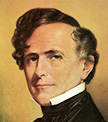
Franklin Pierce
|
| 88 | 1854 | - 1854: Cigarettes introduced into Britain
- 27 Mar 1854: Britain declares war on Russia (Crimean War)
- 25 Oct 1854: Battle of Balaklava in Crimea (charge of the Light Brigade)
|
| 89 | 1855 | - 1855: Australia Chinese
Chinese Immigration Act
- 1855: Australia Vote
Men over the age of 21 in South Australia gain the right to vote
- 6 Feb 1855—19 Feb 1858: Henry John Temple, 3rd Viscount Palmerston, UK Prime Minister (Tory and Whig)

Henry John Temple, 3rd Viscount Palmerston
|
| 90 | 1856 | - 1856: End of Crimean War
- 29 Jan 1856: Victoria Cross created by Royal Warrant, backdated to 1854 to recognise acts
during the Crimean War (first award ceremony 26 June 1857)
|
| 91 | 1857 | - 1857: Work starts on the laying of the Transatlantic cable
- 4 Mar 1857—3 Mar 1861: James Buchanan, 15th President of the United States

James Buchanan
|
| 92 | 1858 | - 1858: 'The great stink'
- 1858: Royal Opera House opens in Covent Garden, London
- 20 Feb 1858—11 Jun 1859: Edward Smith Stanley, 14th Earl of Derby, UK Prime Minister (Tory and Whig)

Edward Smith Stanley, 14th Earl of Derby
|
| 93 | 1859 | - 1859: Peaceful picketing legalised in Britain
- 25 Apr 1859: Work started on building the Suez canal (opened 17 Nov 1869)
- 4 May 1859: Brunel's Royal Albert Bridge opened at Saltash giving rail link between Devon
and Cornwall
- 12 Jun 1859—18 Oct 1865: Henry John Temple, 3rd Viscount Palmerston, UK Prime Minister (Whig)

Henry John Temple, 3rd Viscount Palmerston
- 24 Nov 1859: Charles Darwin publishes "The Origin of Species"
|
| 94 | 1860 | - 1860: Slavery
official abolition of slavery in the Dutch East Indies
- 29 Aug 1860: First tram service in Europe starts in Birkenhead
|
| 95 | 1861 | - 4 Mar 1861—15 Apr 1865: Abraham Lincoln, 16th President of the United States

Abraham Lincoln
- 12 Apr 1861: American Civil War
- 25 May 1861—14 Apr 1864: American Civil War
|
| 96 | 1862 | - 1862: Lincoln issues first legal US paper money (Greenbacks)
- 20 Apr 1862: First pasteurisation test completed by Louis Pasteur and Claude Bernard
|
| 97 | 1863 | - 1863: Football Association founded (UK)
- 1863: Opening of state institution for criminally insane at Broadmoor, England
- 10 Jan 1863: First section of the London Underground Railway opens
|
| 98 | 1864 | - 1864: A man-powered submarine, "Hunley", sank a Federal steam ship, USS Housatonic, at the entrance to Charleston harbour in 1864
- 11 Mar 1864: The Great Sheffield Flood
- 20 Aug 1864: Red Cross established
- 8 Dec 1864: Clifton Suspension Bridge over the River Avon officially opened
|
| 99 | 1865 | - 1865: Elizabeth Garrett Anderson (1836-1917) becomes first woman doctor in England [she later became the first woman mayor in England, in Aldeburgh 1908]
- 1865: First concrete roads built in Britain
- 14 Apr 1865: Abraham Lincoln assassinated in Ford's Theatre by John Wilkes Booth
- 15 Apr 1865—3 Mar 1869: Andrew Johnson, 17th President of the United States

Andrew Johnson
- 5 Jul 1865: William Booth (1829-1912) founds Salvation Army, in London
- 29 Oct 1865—26 Jun 1866: Lord John Russell, 1st Earl Russell, UK Prime Minister (Whig)

Lord John Russell, 1st Earl Russell
|
| 100 | 1866 | |
| 101 | 1867 | - 1 Jul 1867: The British North America Act takes effect, creating the Canadian Confederation
|
| 102 | 1868 | |
| 103 | 1869 | - 1869: Ball bearings, celluloid, margarine, and washing machines, all invented
- 4 Mar 1869—3 Mar 1877: Ulysses S. Grant, 18th President of the United States

Ulysses S. Grant
- 23 Nov 1869: Cutty Sark launched in Dumbarton
|
| 104 | 1870 | - 1870: GPO takes over the privately-owned Telegraph Companies (nationalised)
- 1870: Dr Thomas Barnardo opens his first home for destitute children
- 1870: Water closets come into wide use
- 1870: Diamonds discovered in Kimberley, South Africa
- 1870: Smallpox epidemic in the Netherlands. In 1871 the number of deaths rises to 15,787
- 1870: Netherlands abolished the death penalty
- 1 Oct 1870: First British postcard
|
| 105 | 1871 | - 27 Mar 1871: First Rugby Football international, England v Scotland, played in Edinburgh
- 29 Mar 1871: Opening of Royal Albert Hall, London
- 29 Jun 1871: Trades Unions legalised in Britain, but picketing made illegal
|
| 106 | 1872 | - 1872: Licensing hours introduced
- 1872: Penalties introduced for failing to register births, marriages & deaths (Eng & Wales)
- 4 Dec 1872: American ship "Mary Celeste" is found abandoned by the British brig "Dei Gratia" in the Atlantic Ocean
|
| 107 | 1873 | - 1873: Netherlands
Aceh war . On 8 April, the Dutch colonial army lands on the coast of Sumatra
|
| 108 | 1874 | - 1874: Factory Act introduces 56-hour week
- 1874: Netherlands
Children Act Samuel van Houten. Labour by children under 12 is prohibited.
- 20 Feb 1874—21 Apr 1880: Benjamin Disraeli, the Earl of Beaconsfield, UK Prime Minister (Conservative)

Benjamin Disraeli, the Earl of Beaconsfield
- 5 Apr 1874: Birkenhead Park opened, said to be the first civic public park in the world
|















































